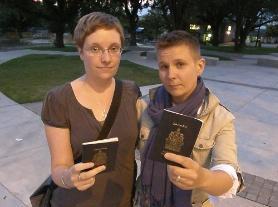The United States may be poised to treat its own same-sex couples as families at the border, but it’s unclear if the change would apply to Canadians and other non-residents.
Current US regulations allow families living together to fill out one Customs form if they are related by blood, marriage or adoption. But the 1996 Defense of Marriage Act defines “marriage” as a union between one man and one woman, so same-sex couples are often told they’re not a family when crossing the border.
According to the existing form, “Each arriving traveler or responsible family member must provide the following information (only one written declaration per family is required).”
The Customs agency is proposing to allow those in a “domestic relationship” to fill out one form as well, such as two adults in a committed relationship with shared financial assets and obligations, including long-time companions and couples in civil or domestic partnerships.
The change would also extend to more children in the family, including foster children, stepchildren, half-siblings, legal wards, other dependants and individuals with a guardianship relationship.
The move is part of a push by the administration of President Barack Obama to recognize more rights for gays and lesbians. But Obama has not yet come out in favour of gay marriage.
Customs has proposed the change for US residents returning to the United States. “The proposed changes would not alter the residency requirements,” according to the Federal Register, a journal of the US government.
Despite that explicit language, a Customs spokeswoman doesn’t know if the change would apply to foreigners as well.
Gays and lesbians have complained for years that US Customs require them to fill out separate forms, telling them they are not a family even if they’re married or living together.
In 2002, a Canadian same-sex couple who won the right to marry in Ontario was offended when, the following year at the US border, they were instructed to fill out separate Customs forms. Kevin Bourassa and Joe Varnell refused to do so and were denied entry, according to their blog.
In August, Xtra wrote about East Vancouver couple Karen-Marie and Andrina Perry, who were upset when Customs agents told them they weren’t a family while crossing the border.
Karen-Marie Perry says the new regulation, if adopted, would be good news.
“For me it’s a huge issue when our bond of marriage is broken at the border like that,” she says. “However, I’m still mindful of political work that needs to be done regarding borders’ heightened security and the diminishment of civil liberties, the harassment of trans folks at the border and the recognition of the rights of all queers whether they choose to marry or not.”
When Xtra inquired about the Perry’s case last August, a US Customs official said the definition of family that applied to US residents applies to foreigners as well. That would suggest the revised regulation would apply to Canadians and other non-US residents. But Customs was non-committal when Xtra called on March 27. A spokesperson says the agency’s legal department is looking into the matter.
Victoria Neilson, legal director for Immigration Equality, which pushes for equal immigration treatment for queer and HIV-positive people, thinks people who are not US citizens would still have to fill out separate forms under the proposed revision.
“We’re going to look into that and speak to the administration about what the reasoning is for the difference,” she says. “If they are respecting our families in one context they should do so in the other.”

 Why you can trust Xtra
Why you can trust Xtra


